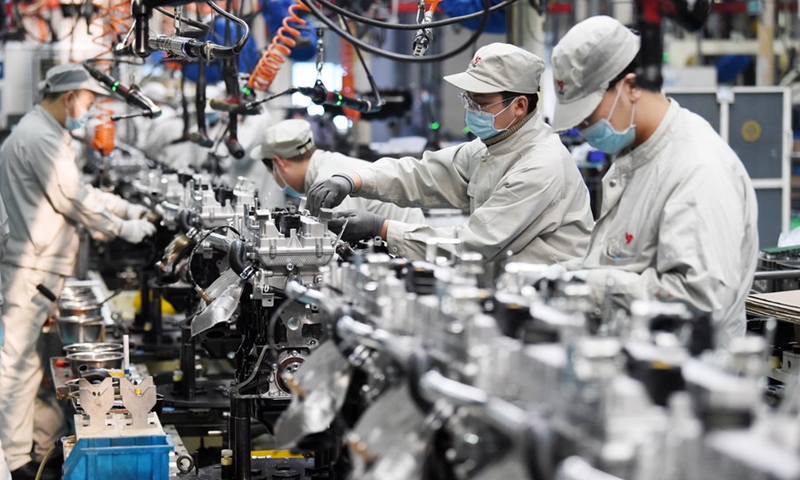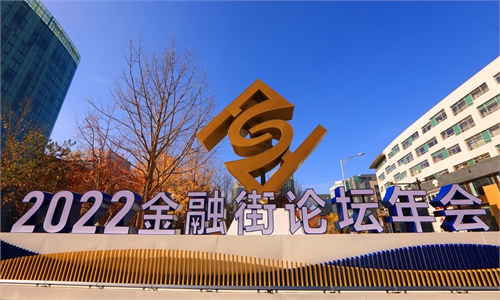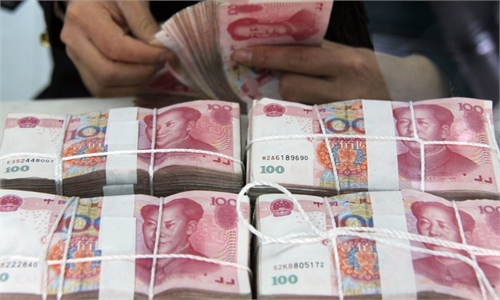Prominent Chinese economists predict more policy support to boost growth
Discussions come as nation set to outline top policy priorities

People work at a workshop in Northeast China's Heilongjiang Province. Photo: Xinhua
Some prominent Chinese economists have predicted that China will further step monetary policy support for the economy, after a series of recent government support measures to shore up the world's second-largest economy to ensure growth in a reasonable range.
The discussion of easier monetary policy comes as the country is set to hold the Central Economic Work Conference, a key meeting that outlines top policy priorities for the next year, and as it implements 20 optimized measures for combating COVID-19 and bolstering economic development.
Predictions for further pro-growth policy measures over the weekend came after the decision by the People's Bank of China (PBC) on a universal 25 basis points (bps) reduction in financial institutions' reserve requirements. The move could inject about 500 billion yuan ($69.72 billion) of long-term funds into the economy.
China has more leeway in anchoring its monetary policy in 2023 as the country will likely trend toward "easing" on the basis of a prudent stance, said Lian Ping, president of the China Chief Economist Forum.
The economy could face persistent downward pressure in 2023, and a proactive fiscal policy necessitates a supportive monetary policy, Lian said.
Yu Yongding, a member of the Chinese Academy of Social Sciences, speaking at a separate forum, stressed that at the moment China must prioritize ramping up growth rather than curbing inflation, according to a report by domestic financial news portal yicai.com on Sunday.
Yu said that placing an emphasis on curbing financial risks does not contradict efforts to ramp up economic growth.
Expansionary fiscal policy should be maintained, Yu said, suggesting that additional issuances of treasury bonds, further loosening of monetary policy and further lowering interest rates should be among the tools applied by China's policymakers.
Experts interviewed by the Global Times on Monday said that ensuring stable economic growth would be a main theme in the coming months and even next year, as the measures would also be aligned with the goal of seeking high-quality growth stressed during the recently concluded 20th National Congress of the Communist Party of China.
Experts noted that the abating of US interest rate hikes will also provide an external environment for China to keep its monetary policy loose.
Liao Qun, chief economist with Chongyang Institute for Financial Studies at Renmin University of China, told the Global Times that there could be six more cuts in reserve requirements, at 50 bps each time, down the road to provide more liquidity support to the economy.
Liao said that fiscal policy can also be ratcheted up with more treasury bond issuances, which means a higher deficit level.
These policies' support will be directed toward infrastructure development to shore up the economy, Liao said. "Infrastructure investment has been accelerated by a large margin but there is still plenty of room for further, bigger investment and such investment will also pave the way for high-quality development."
As the Chinese economy faces headwinds from weakening external demand and the fallout of the epidemic, the Chinese government has been ramping up policy support.
Last week, the PBC and the China Banking and Insurance Regulatory Commission issued a 16-step guideline to encourage commercial banks to grant loans to real estate developers.
The Ministry of Industry and Information Technology, along with two other ministries, jointly issued a notice last week with the aim to consolidate industrial production. The notice listed 17 measures to shore up the development of major industries, varied enterprises and different regions in China.
Li Changan, a professor at the Academy of China Open Economy Studies of the University of International Business and Economics, told the Global Times on Monday that stabilizing economic growth will be on top of the government's agenda in the fourth quarter and in 2023.
"The balance between epidemic control and economic development will also be an important theme," Li said, noting that if the epidemic is kept at bay in 2023, a reasonable growth rate can be expected.
The Chinese economy expanded by 3.9 percent in the third quarter, official data showed. For the first three quarters of 2022, growth came in at 3 percent year-on-year.
Liao said a reasonable annual economic growth range of around 5 percent should be attempted with macroeconomic policy support.




